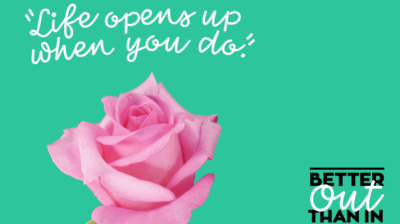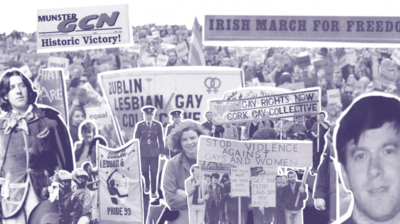Experiences of sexual health in the LGBTI+ community
Rían interviews Robbie Lawlor and Shawna Scott about their experiences on accessible sexual health education within the LGBTI+ community.

This is part one of Rían’s two-part interview with Robbie Lawlor and Shawna Scott.
Sexual health education in Ireland leaves much to be desired. Information catering to those within the LGBTI+ community is virtually non-existent. This often leaves LGBTI+ young people in the dark, either left to seek information themselves through the internet or completely unaware of how to stay safe and are left at risk to sexually transmitted infections. A report published as part of the National LGBTI+ Youth Strategy highlighted all of these issues. With many young people feeling that sex education focused too heavily on ‘traditional’ relationships. Among the report’s recommendations included mandatory LGBTI+ inclusive sexual health and relationship education in schools.
Many LGBTI+ young person’s first encounters with sex often come from representation through the media and in porn, both of which can be highly inaccurate when it comes to depicting LGBTI+ sexuality and relationships but are often the only resources available. This can lead to incredibly unhealthy and uninformed expectations when it comes to sex and relationships.
I spoke with Robbie Lawlor (HIV activist & sex educator) and Shawna Scott (entrepreneur & owner of sexsiopa.ie) about their experiences and opinions on accessible sexual health info and education within the LGBTI+ community.
Robbie Lawlor, HIV+ activist and sex educator, reflects on the lack of representation of LGBTI+ people growing up as a teenager and how it affected his development as a young person. “I went to an all-boys Christian brother’s school. Sex never really appealed to me the way it did to my school mates. I felt different because I wasn’t having the same feelings as my friends.” Robbie explains spending his teenage years not understanding this feeling of difference, casual schoolyard homophobia, until coming out at 18. “I remember being angry. Why was I denied these feelings growing up?”
Referring to the work of organisations such as ShoutOut and BelongTo, Robbie feels this culture is beginning to change.
“While many young LGBTI+ people may have brilliant, fulfilling lives, we normally live our teenage years without that template of intimacy that our hetero friends have. I admire young people embracing their queerness from a very young age and I think that really needs to be celebrated.”
Shawna Scott is an entrepreneur and owner of sexsiopa.ie. The Seattle native reflects on her upbringing in a conservative suburb of an otherwise liberal city.
“I got a lot of mixed messages,” she says. “On the one hand we were taught that you should wait till marriage to have sex and that homosexuality was a sin – all the stereotypes – but our public schools are also required by law to give comprehensive sex ed.”
“When I became sexually active my mother took me to our family doctor to get the pill. I was very lucky to have that safety net of my mother’s pragmatism when it came to having a sexually active daughter and attending a good public school. It allowed me to think about and question what I was being taught in church and by the more conservative adults in my life. My mum continually made sure that both my younger sister and I knew throughout our adolescence that if we had any questions about sex or relationships that we could always come to her, and that made such a difference, especially when I compare my upbringing to close friends’ who would have never been able to talk about sex with their parents.”
A recent survey found that 7 out of 10 young people in Ireland had never been tested for an STI. Although not specific to the LGBTI+ community, the findings are stark in contrast to the sexual healthcare services currently available to young people.
“In Dublin, the services are there for gay, bi, and trans people, we just aren’t doing enough to empower young people to use them. I never even heard of the Gay Man’s Health Service going through college. Many people either don’t know about the service or don’t use it. St James’ GUIDE Clinic and HIV Ireland have free testing facilities too.” Robbie says.
Robbie also makes note of ‘The Know Now’ service which provides rapid HIV testing services within communities in Dublin, Limerick and Cork. “You can know your HIV status in less than 60 seconds. Services are available and we should absolutely utilise them more.”
Oftentimes LGBTI+ sexual health services tend to be aimed toward gay and bisexual men, leaving gay and bisexual women as well as members of the transgender community at a loss when it comes to finding accessible information that applies to them.
“The sexual health of lesbians has always been neglected. It is known that lesbians are less likely to contract certain STIs but are more susceptible to others, such as BV, herpes, HPV, syphilis, Hep A & B etc. Knowledge is power and everyone should make informed decisions about their sex and sexual health. Women who have sex with women should have access to sexual health education that is inclusive of bi & lesbian sex and to STI preventatives such as dental dams, We must ensure that there are sexual health campaigns that are targeted towards the lesbian and bi community. Sadly, there are no such nationwide campaigns happening at the moment.” Robbie says.
Shawna believes that the HIV/AIDS crisis, along with the schemes and campaigns that emerged from the time, necessitated the LGBTI+ community to communicate and discuss sexual health more openly than their heterosexual counterparts. She questions whether that is the case today
“Our young people generally across the board have two things working against them: they don’t have a sexual health epidemic as part of their living memory, and sex education is incredibly variant depending on where you attend school. Because of this, so many young people may be operating under the assumption that it will never happen to them.”
Robbie believes that, despite being ‘more sexually liberated than ever before’, sex in general is still considered a ‘dirty topic’, the stigma of which ‘has created a public health crisis’. He says that the stigma around discussing sex and sexual health is a national issue rather than an LGBTI+ specific one. He acknowledges that adding in the element of being queer, something in and of itself has been considered sexual in the past, can make this even more problematic, not only restricting access to information but also feeding into our own perception of sex and sexual health.
The culture and society we live in plays a huge role in our relationship and experiences with sex, even more so as a member of the LGBTI+ community. This ‘coin toss’ can have either a positive or negative effect, oftentimes the later, inhibiting the ability to access necessary information, healthcare or have an open discourse around the subject. Thankfully, this is slowly beginning to change.
This article was written by a spunout volunteer. Check out our volunteering options here and get in touch if you’re interested in getting involved.
Feeling overwhelmed and want to talk to someone?
- Get anonymous support 24/7 with our text message support service
- Connect with a trained volunteer who will listen to you, and help you to move forward feeling better
- Whatsapp us now or free-text SPUNOUT to 50808 to begin.
- Find out more about our text message support service
If you are a customer of the 48 or An Post network or cannot get through using the ‘50808’ short code please text HELLO to 086 1800 280 (standard message rates may apply). Some smaller networks do not support short codes like ‘50808’.






